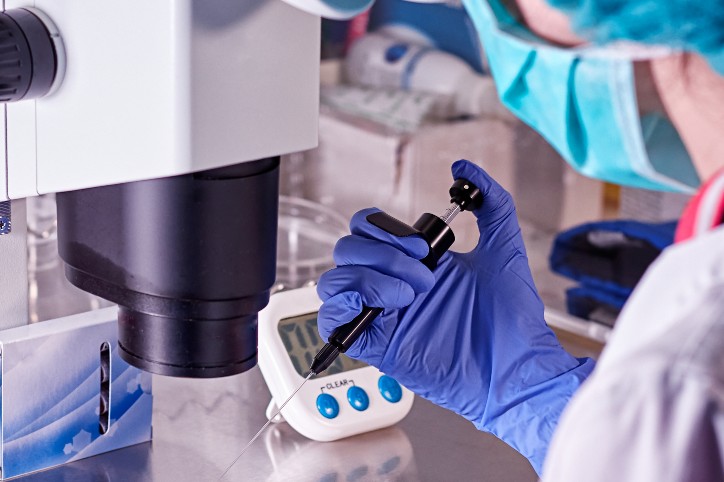Starting fertility treatments can be overwhelming. I know I had many, many, many questions when I started on my journey. At the time they mostly involved needles, pain, and success rates but there are so many other important things to ask your provider, many of which don’t necessarily seem obvious.
With that in mind we turned to Claire O’Neill, a fertility industry expert and creator of FertilitySpace, an online platform that helps people find providers and educate themselves about their options, for her insight on the most important questions to ask your provider when starting fertility treatments.
What is my diagnosis & how does this affect my ability to conceive?
“It’s so important to understand what your diagnosis is and what that means for your family-building goals. If you have a good understanding of what is causing your difficulty to conceive, you’ll feel much more in control and better able to advocate for yourself throughout the process.
Your diagnosis could affect what type of treatment is recommended for you, what sort of medications you’ll take, and even your chance of success with a particular treatment.
However, be aware that your doctor might not be able to identify what the exact issue is, even after comprehensive fertility testing of your and your partner. The most recent IVF data in the US reported that 11% of patients undergoing IVF had unexplained infertility. This doesn’t mean you won’t have success with treatment, it’s just good to know ahead of time that your doctor may not always have a specific answer for why you’ve been having difficulty getting pregnant.”
What are the success rates for this treatment based on my age?
“Fertility is highly dependent on a woman’s age, which is why fertility treatment success rates are always stratified by how old a woman was at the time of treatment.
If your doctor recommends doing intrauterine insemination (IUI), you’ll definitely want to ask what your chances of success are per cycle. Success with IUI is much lower per cycle than IVF however it’s less invasive and more cost-effective. So in many cases, doctors often suggest doing 1-3 rounds of IUI first before considering IVF.
When it comes to IVF, it’s not only important to ask what the general success rates are for your age and diagnosis but also what the success rates are for your age at this particular clinic.
Success rates for IVF do vary from clinic to clinic so it’s important to ask your doctor what their success rates are at their practice so that you can get a realistic idea of what to expect.
The procedures done for IVF can depend a lot on the skill of the doctor and the embryology lab, so IVF success rates can vary from clinic to clinic. Keep in mind that success rates for a particular clinic don’t always give you a realistic idea of success. If you’re working with a small clinic, they might not do enough annual cycles to give you accurate averages, so looking at the national statistics can be a helpful supplement in this case.
If you’re looking to compare your options, you can check IVF success rates for different fertility clinics on their FertilitySpace profiles. We show a chart of each clinic’s success rates compared to the national averages to help give you an idea of what a round of IVF may look like for you.”

Are there any lifestyle changes I can make to help improve my chances of getting pregnant?
“Struggling with infertility can make a lot of women feel a loss of control and it can be beneficial to ask whether there is anything you can do to assist with your fertility goals.
These recommendations really can depend on your lifestyle habits and your doctor’s treatment style.
Ask if there is anything you should change in your lifestyle as far as weight-based goals, alcohol intake, diet, and supplements.”
Who is my contact if I have any questions during treatment?
“There is a lot of information to be learned when starting fertility treatments so it is likely that you will have questions throughout the process.
Fertility clinics can be notoriously difficult to get a hold of so it’s important to take note of who is your primary contact, when you can best reach them, and the preferred method for how they can be reached. If you have a designated nurse and the nursing line phone number, that should help a lot.
Some doctors will give you their direct phone number in case you need to reach them but for most patients, the nursing line and the after-hours line will be your go-to for questions.
When you’re getting started at a fertility clinic, you’re usually given some hefty packets of information to get you started. Be sure to read through all documents, mark everything on a calendar or timeline and reach out as soon as you have a question.
Keep a running list of questions to ask at appointments and make sure you get them all answered before you leave. Don’t be shy! Walk around and hit all the different departments you need to speak with such as scheduling, billing, andrology, etc.
Larger clinics can be very fast-paced so you need to be your own advocate to make sure you don’t miss any instructions.”
What is the plan if this treatment is not successful?
“Hopefully you’ll have success with your first treatment cycle but it’s very important to set expectations between you and your doctor. IVF does not guarantee a baby and some women will need to do more than one round of treatment.
If your first cycle is not successful, what would be your doctor’s recommendation for next steps?
How many cycles of treatment A would they recommend before considering treatment B?
Some patients have found it helpful to agree on a maximum number of cycles that they’re willing to do before reevaluating whether they want to continue treatment or try something else.”








